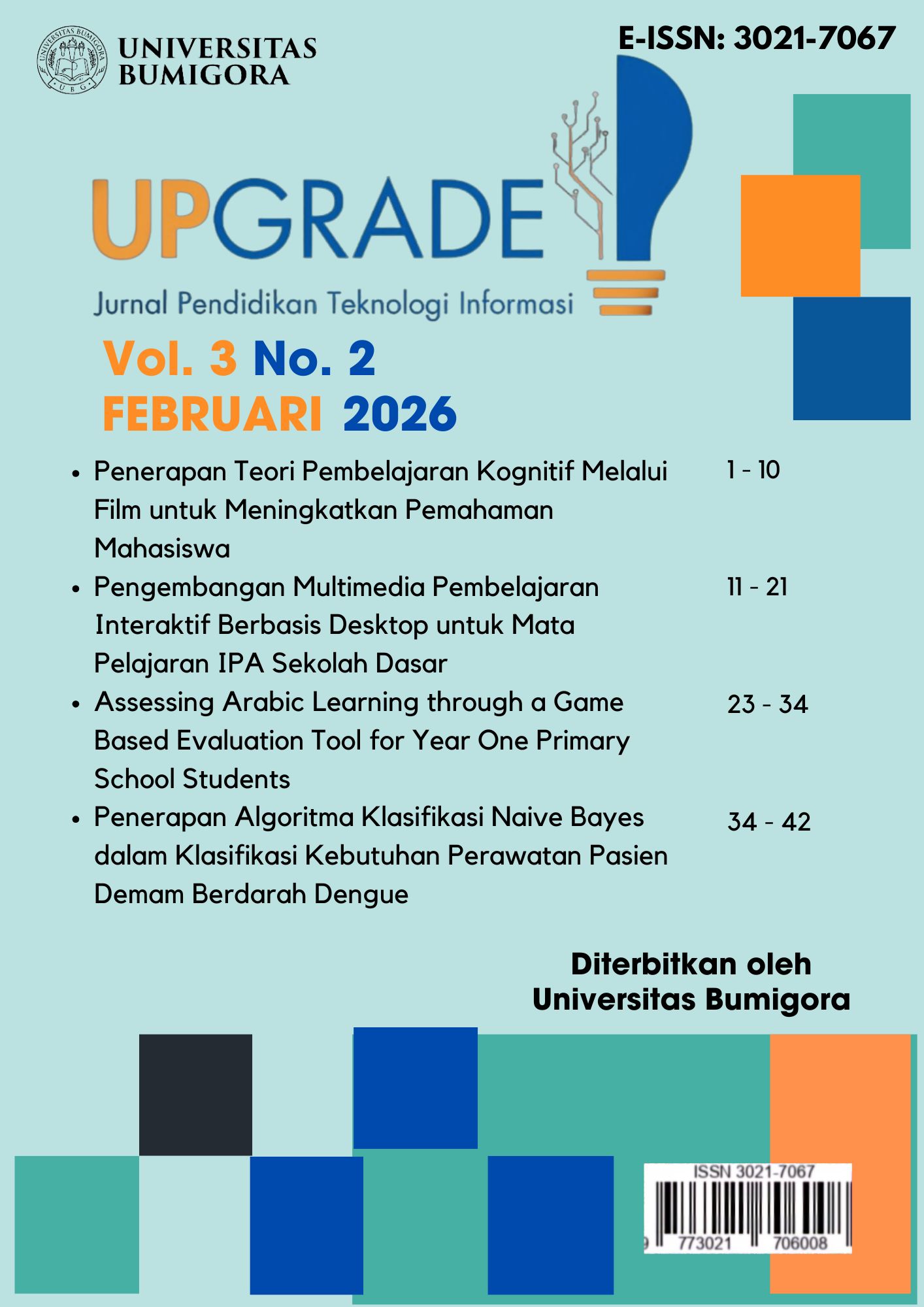Assessing Arabic Learning through a Game-Based Evaluation Tool for Year One Primary School Students
DOI:
https://doi.org/10.30812/g3yk7e05Keywords:
Game-based, Evaluation tool, Arabic Learning, Primary School, Student' engagementAbstract
An effective Arabic assessment model for first-grade students combines both formative and summative methods to evaluate foundational language abilities—like recognizing letters, understanding vocabulary, and forming basic sentences—as well as early analytical skills, such as identifying word roots and grasping simple grammar. These evaluations integrate engaging interactive tools, including digital quizzes, multimedia prompts, and educational games that adapt to each child’s learning pace while offering immediate feedback. This study aims to evaluate the effectiveness and accuracy of a game-based evaluation tool (Wordwall) in Arabic language learning for Year One primary students at MIN 2 Sumenep. This study used mixed method with a quasi-experimental design through pre-test and post-test of a study group. There were 28 students who completed ten interactive tasks, matching picture test, audiovisual quizzes, spin wheel activities, and letter sequencing exercises for fruit vocabulary. The result of this study showed that 78.6%-92.9% of students found Wordwall’s visuals, functionality, and motivational features engaging and easy to use. Overall, Wordwall delivered an 83% improvement in learning efficiency and achieved a 94,6% accuracy rate in vocabulary mastery. These findings concludes that game-based assessments can simultaneously boost engagement and assessment precision. The study’s novelty lies in focusing on early grade Arabic evaluation within the Merdeka Curriculum framework. Implications include recommending wider adoption of game based evaluation tools, structured teacher training in interactive design,
References
Aeni, A. N., Djuanda, D., Maulana, M., Nursaadah, R., and Sopian, S. B. P. (2022). Pengembangan
Aplikasi Games Edukatif Wordwall Sebagai Media Pembelajaran Untuk Memahami Mater Pendidikan
Agama Islam Bagi Siswa SD. Primary: Jurnal Pendidikan Guru Sekolah Dasar, 11(6):1835–1852.
https://doi.org/10.33578/jpfkip.v11i6.9313.
Al-Dosakee, K. and Ozdamli, F. (2021). Gamification in Teaching and Learning Languages: A Systematic
Literature Review. Revista Romaneasca pentru Educatie Multidimensionala, 13(2):559–577. https:
//doi.org/10.18662/rrem/13.2/436.
Ary, D., Jacobs, L. C., Sorensen, C., and Razavieh, A. (2019). Introduction to Research in Education.
Cengage Learning, 10 edition.
Chen, M., Tseng, W., and Hsiao, T. (2018). The effectiveness of digital game-based vocabulary learning:
A framework-based view of meta-analysis. British Journal of Educational Technology, 49(1):69–77.
https://doi.org/10.1111/bjet.12526.
Creswell, J. W. and Plano Clark, V. L. (2018). Designing and Conducting Mixed Methods Research.
SAGE, Thousand Oaks, 3 edition.
DeVellis, R. F. (2017). Scale Development (Fourth Edition). In Scale Development Theory and Applications.
SAGE Publications, Thousand Oaks, 4 edition.
Field, A. (2018). Discovering Statistics Using IBM SPSS Statistics. Sage, Newbury Park, 5 edition.
Gandasari, P. and Pramudiani, P. (2021). Pengaruh Aplikasi Wordwall terhadap Motivasi Belajar IPA
Siswa di Sekolah Dasar. Edukatif : Jurnal Ilmu Pendidikan, 3(6):3689–3696. https://doi.org/10.
31004/edukatif.v3i6.1079.
Hasanah, N. and Sutiah, S. (2023). Pengembangan Materi Evaluasi Pembelajaran Berbasis Wordwall
Untuk Siswa Sekolah Dasar. SITTAH: Journal of Primary Education, 4(2):153–166.
Hermita, N., Vebrianto, R., Putra, Z. H., Alim, J. A., Wijaya, T. T., and Sulistiyo, U. (2022). Effectiveness
of Gamified Instructional Media to Improve Critical and Creative Thinking Skills in Science Class.
Advances in Science, Technology and Engineering Systems Journal, 7(3):44–50. https://doi.org/
10.25046/aj070305.
Idrus, N. W., Yulianti, D., and Suparman, U. (2021). Pemanfaatan media wordwall dalam peningkatan
perbendaharaan kosakata (vocabulary) pada pembelajaran bahasa Inggris. AKSARA: Jurnal Bahasa
dan Sastra, 22(2):376–387. https://doi.org/10.23960/aksara/v22i2.pp376-387.
Kirotul Umah, I. M., Yandari, I. A. V., and Hakim, Z. R. (2023). Pengembangan Evaluasi Berbasis
Digital Melalui Web Wordwall Pada Peserta Didik Kelas V Sekolah Dasar. Jurnal Pendidikan Dasar
Perkhasa: Jurnal Penelitian Pendidikan Dasar, 9(2):269–278. https://doi.org/10.31932/jpdp.
v9i2.2081.
Latifah, U. and Damayanti, M. I. (2022). Pengembangan Alat Evaluasi Pembelajaran Menggunakan
Platform Wordwall.Net Untuk Siswa Kelas II Sekolah Dasar. JPgsd, 10(6):1415–1424.
Li, W., Yu, J., Zhang, Z., and Liu, X. (2022). Dual Coding or Cognitive Load? Exploring the Effect
of Multimodal Input on English as a Foreign Language Learners’ Vocabulary Learning. Frontiers in
Psychology, 13. https://doi.org/10.3389/fpsyg.2022.834706.
Mardhiyah, A. (2023). Pemanfaatan Media Pembelajaran Wordwall Sebagai Evaluasi Pembelajaran Pada
Mahasiswa Pendidikan Agama Islam. Muta’allim: Jurnal Pendidikan Agama Islam, 1(4):481–488.
https://doi.org/10.18860/mjpai.v1i4.2710.
Mayer, R. E. (2024). The Past, Present, and Future of the Cognitive Theory of Multimedia Learning.
Educational Psychology Review, 36(1):8. https://doi.org/10.1007/s10648-023-09842-1.
Moorhouse, B. L. and Kohnke, L. (2024). Creating the Conditions for Vocabulary Learning withWordwall.
RELC Journal, 55(1):234–239. https://doi.org/10.1177/00336882221092796.
Oktavia, L. S., Neviyarni, and Irdamurni (2021). Perkembangan Anak Usia Sekolah Dasar : Kajian Untuk
Siswa Kelas Rendah. Jurnal Pendidikan Tambusai, 5(1):1823–1828.
Rahmayanti, I. and Abidin, M. (2023). Efektivitas Penggunaan Wordwall Sebagai Media Evaluasi
Pembelajaran Bahasa Arab di MAN Kota Batu. Sustainable Jurnal Kajian Mutu Pendidikan, 6(2):349–
358. https://doi.org/10.32923/kjmp.v6i2.3413.
Sharifuddin, S. S. and Abdullah, M. H. (2023). The Effectiveness of Gamification In Teaching and
Learning English As a Second Language. Journal of Management Scholarship, 2(2):210–215. https:
//doi.org/10.38198/jms/2.2.2023.25.
Subiantoro, N., Lailiyah, J. I., Saputra, M. A. M., and Nurwahid, M. (2025). Implementation of
Vygotsky’s Developmental Psychology Theory to Overcome Mathematics Learning Anxiety. LINEAR:
Journal of Mathematics Education, 6(1):14–30. https://doi.org/10.32332/0h11yh51.
Umar, Rahman, R. A., Mandarsari, P., Mawarwati, and Amir, S. (2023). Using Word Wall Website
As A Strategy To Improve Students’ Vocabulary Mastery. Journal on Education, 05(03):9654–9661.
https://doi.org/10.31004/joe.v5i3.1779.
van Nooijen, C. C., de Koning, B. B., Bramer, W. M., Isahakyan, A., Asoodar, M., Kok, E., van
Merrienboer, J. J., and Paas, F. (2024). A Cognitive Load Theory Approach to Understanding Expert
Scaffolding of Visual Problem-Solving Tasks: A Scoping Review, volume 36. Springer US. https:
//doi.org/10.1007/s10648-024-09848-3.
Widhiatama, D. A. and Brameswari, C. (2024). The Effectiveness of Wordwall in Enhancing Students’
Engagement and Motivation in Literature Classes. International Journal of Linguistics, Literature and
Translation (IJLLT), 7(4):15–24. https://doi.org/10.32996/ijllt.
Yanuarto, W. N. and Setyaningsih, E. (2024). A learnability study on Wordwall.net: Online educational
tool for mathematics learning. Al-Jabar : Jurnal Pendidikan Matematika, 15(1):119–130. https:
//doi.org/10.24042/ajpm.v15i1.20806.
Zahroh, P. N., Yusuf, W. F., and Yusuf, A. (2024). Penggunaan Media Wordwall Dalam Evaluasi
Pembelajaran. Tadbir Muwahhid, 8(1):123–139. https://doi.org/10.30997/jtm.v8i1.12805.
Zalillah, D. and Alfurqan, A. (2022). Penggunaan Game Interaktif Wordwall dalam Evaluasi Mata
Pelajaran Pendidikan Agama Islam di SDN 17 Gurun Laweh Padang. Manazhim, 4(2):491–504.













